A few years ago my husband and I began our path down the road to self sufficiency. Being meat eaters, we couldn’t really call ourselves self sufficient without raising our own! So, we decided to get our feet wet and started with meat chickens like most do. Our initial round of birds we raised were the Cornish Cross because well, that’s what everyone raises! So they must be good right? Wrong. Well, wrong for us at least. We couldn’t stand these birds, and after that first round we swore we would never raise them again…and we haven’t. We immediately switched to the Rangers. A robust, slower growing breed that is more adapt for being raised on pasture. We have raised a couple hundred since then, and have been beyond thrilled with the breed overall.
So why the Rangers and not Cornish Cross? Read on!
Cornish Cross
My experience with the Cornish Cross was not a pleasant one. Ultimately, the breed itself just wasn’t right for the environment we raise them in (pasture versus confined) and their obvious genetic selection for certain attributes just didn’t sit well with me. Again, this is my experience. I know plenty of people that happily raise them and plenty of others that have sworn them off just like me. Some key points are:
- They aren’t hardy. The Cornish Cross are a hybrid breed just like the Rangers. However, the breeding stock are chosen for very specific traits such as exaggerated large breasts to meet the high demand of white meat eaters, sparse feathering, wide set legs, extremely fast growth, and foraging suppression. All of these traits are desirable for the large scale poultry farms, which is the industry the breed was tailored for. These traits aren’t natural, and as a result, the bird’s health suffers. Their body is designed to put on an incredible amount of weight in a short amount of time, causing other systems to be compromised. They are notorious for leg issues and organ failure among other health problems. This is why most people don’t raise them past the 8-10 week mark because they physically will not be able to make it. After this point, the mortality rate spikes and you are really taking a gamble on if the birds survive no matter how well you care for them. In addition to health issues, they are very sensitive to extreme temperatures and are not equipped to withstand the elements of inclement weather. All it takes is one short heat wave to completely devastate your flock, I have seen it personally.
- Yes, they grow fast. But I mean man do they grow fast. They have a high feed conversion ratio meaning they very efficiently and quickly convert their feed weight. They do it better than any other breed and is one of the many reasons why they are a favorite of large poultry farms as well as homesteaders.
- They just don’t seem natural. If you’ve ever seen an animal in its live form and thought “man that thing is gross I wouldn’t even want to eat it” that’s how I feel about the Cornish Cross. Their splotchy feathering and exaggerated wide set legs to support their front heavy stature make them look like a science project gone awry. It just isn’t natural. Even worse, we had to prop their food trough up on bricks to raise it so they actually had to stand to eat. Otherwise, they would lay down in front of the food dish, in their own poop, and eat. No matter how much space they had to move and forage, once they reached a couple weeks old these birds would plop themselves in front of the food trough all day long. Overall, they are minimal foragers in comparison to other breeds which for us is a big no no.
Let’s sum them up:
- Pros: do well in confinement setting, reach slaughter weight quickly (as little as 6 weeks), easier to pluck due to sparse feathering, large breasts for white meat lovers, widely available.
- Cons: don’t make good foragers, generally unhealthier and lack of hardiness, don’t display normal chicken behaviors, unhygienic.
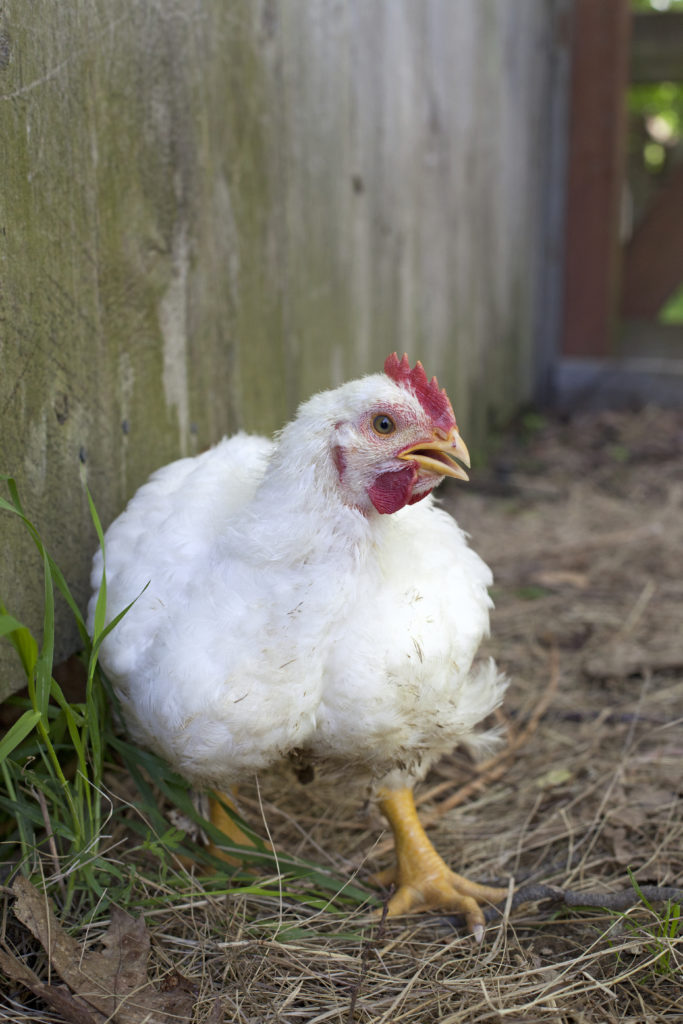
Rangers
Since switching to the Rangers we have been extremely happy with their performance. They are a slower growing breed which allows more flavor to impregnate the meat that you just can’t get in a quick growing bird. They are also known for their dark meat, which makes them more desirable if you are a chicken leg lover such as myself. Some key points are:
- The Rangers are very similar to dual purpose laying hens in their appearance and personality. They are fully feathered with their breast meat being proportional to their body unlike a Cornish. They also display normal behaviors such as active foraging, roosting, taking dust baths, etc. Even with a feeder full of grain, they will still opt to forage making them an ideal pastured bird.
- I have raised Rangers in varying temperatures and seasons without issue. They are very hardy and are able to hold up to inclement weather regardless of a heat wave or cold snap without any special accommodations. Because we raise our birds on pasture, this is an absolute necessity without a controlled environment.
- They grow considerably slower than the Cornish Cross. While the average age to process is around the 12-14 week mark, we have never processed our birds that early. We always end up pushing them out further and process between 16-20 weeks, and have dressed weights between 7-8 pounds. There are two schools of thought on this: Some see this as a negative because they want the birds to grow out as fast as possible. Others see this as a good thing because longer growth equates to more flavorful meat. I take the latter point of view, and like the slower growth rate. It allows more time for flavor to develop, but because we process our own birds it also gives us the luxury of processing them on our own time. Unlike the Cornish, the Rangers will not succumb to multiple system failures so they can be processed whenever we get to them whether they’re 10 weeks or 10 months old.
Let’s sum them up:
- Pros: natural foragers reducing feed costs, very hardy, display normal chicken behaviors, more flavorful meat, great for dark meat lovers
- Cons: take longer to reach slaughter weight (if you consider that a con, which I don’t), fully feathered so harder to pluck, smaller breasts than Cornish Cross (again not a con for me, they’re far from “small”!)
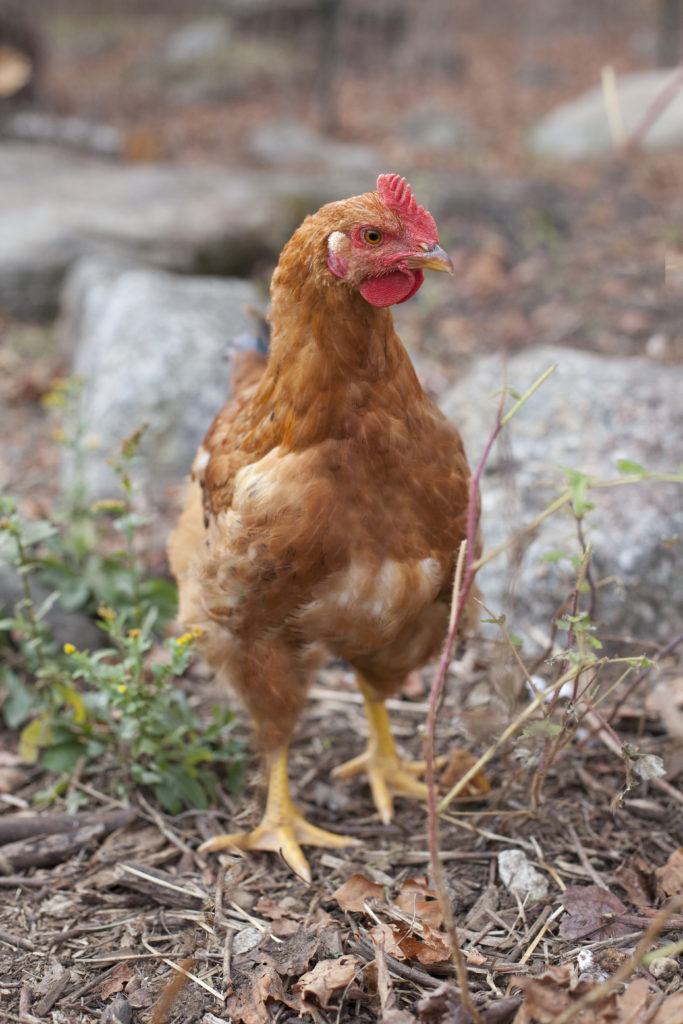
Let's Talk About Slow Meat
Everyone is familiar with the notion that you can’t rush quality, and meat chickens are no exception to this rule. Flavor takes time, and it’s a process that can’t be rushed. This is a concept that people are starting to realize with the “slow meat movement” taking its hold.
Is there really a noticeable difference though? Absolutely!!!! Night and day. A big part of the difference in flavor is of course the feed given to the birds as well as supplemental pasture. But, time is a huge part of it as well and is a variable that can’t be rushed. If you raised a Cornish Cross and a Ranger side by side under the same exact conditions and processed them at their respective average slaughter ages, there would be a noticeable difference in the appearance and flavor.
As I previously emphasized, choosing the breed of meat chicken to raise is very much a personal preference based on what is important to you. Maybe you don’t care that the Cornish aren’t foragers because you’re going to raise them in a small pen. Or you live in a hot climate and want to raise them in the summer so you need a hardier animal and decide to go with the Rangers. I know people who raise the Cornish Cross knowing that they will always lose at least 10% of their flock, and they are okay with that, so they order extra anticipating loss. It is a personal choice just like anything else.
We love raising the Rangers because to us, they are how a chicken should be. Natural. They run, scratch through the dirt, chase each other fighting over worms, thrive raised on pasture, and just all around are a robust healthy bird. Sure it takes longer for them to grow, but it’s a non issue because the result is incredibly nutrient dense delicious chicken for us! But, as they say the proof is in the pudding! See for yourself as I teach you how to break down a whole chicken. You just can’t get that dark red meat and healthy yellow fat from a fast growing sedentary bird.
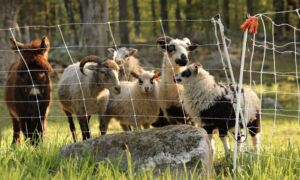
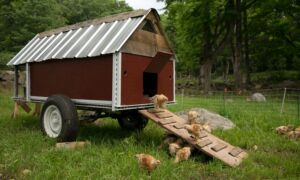
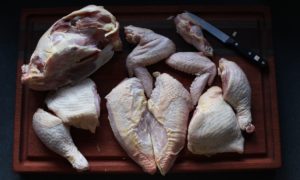
Pingback: Pressure Cooker Chicken Bone Stock | The Modern Day Settler
Pingback: Breaking Down a Whole Chicken | The Modern Day Settler
Pingback: Goodbye Chickens, Hello Ducks! | The Modern Day Settler
Yes! I agree 100%. The Cornish cross just seems cruel and unnatural. I’ve been looking into different meat birds for a while. And after reading this I think we’re gonna try to rangers! Thanks for the awesome post.
We absolutely LOVE them. Hopefully you feel the same after raising them!
Let me just tell you that my husband and I have been considering a huge life change, we have been pescitarian for more than 10 years and in the last year or we have been digging deep and thinking about what we eat and how processed all this faux meat is and cut it down considerablely, to add we are both farmers and raise pastured laying hens and vegetables so adding rangers would be easy for us and we have been so unsure but after reading this and also agreeing that the Cornish cross gross me out and feel so unnatural to me! We are looking into rangers!!!!! That comment was so scattered because that’s how my brain feels but just wanted to say thanks for the insight and inspiration
I totally understand the scatter! 😀 I’m glad you found this helpful! The Rangers are JUST like laying hens, so it will be a very seamless transition for you in terms of care and what you’re used to in behavior. They are nothing like the Cornish! Please stop back and let me know how your experience with them goes!
Do you order hens only?
We never have before, but this year we did!
Pingback: How To Freeze Fresh Corn – The Modern Day Settler
Pingback: The Emotional Toll of Raising an Animal for Meat – The Modern Day Settler
Great article. I was wondering what you were given them for feed and how much.
We fed Stone House Grain Organic/Non-GMO/Soy Free. They have access to feed all day (except when they’re locked in the trailer at night). Last year we went through a half ton of feed for ~30 hens, and had an average dressed weight of 7 pounds.
Long time supporter, and thought I’d drop a comment.
Your wordpress site is very sleek – hope you don’t mind me asking what theme you’re using?
(and don’t mind if I steal it? :P)
I just launched my site –also built in wordpress like yours– but the theme slows (!)
the site down quite a bit.
In case you have a minute, you can find it by searching for “royal cbd”
on Google (would appreciate any feedback) – it’s still in the works.
Keep up the good work– and hope you all take care of yourself
during the coronavirus scare!
Hey there, thanks for the support! I am using Ocean WP theme. It’s a free theme, I just customized the heck out of it. I too am having issues with my site loading slowly, which I really need to work on just haven’t had the time. Websites are a work in progress, you’ll get there!
Everything I have read and watched on your YouTube, Instagram, and now your blog has been very to the point and interesting and helpful and informative. Please keep them coming. Thank you for what you do to educate and share your ideas with others.
Thank you for reading and following along!
We raise freedom rangers also, for alot of the same reasons you made. We have never raised cornish crosses though. We also go past 14 weeks. We let our birds free range also and yes the meat is wonderful. Loving your site & socials, we have been thinking about pigs, but haven’t taken the leap yet. Thanks for sharing your experiences.
Instagram follower : )
Do you prefer roosters over hens or vise versa and why? We have a hatchery local to us in Lancaster County, PA.
I prefer hens, because roosters will just end up fighting all the time!
Do you vaccinate your rangers. Had a huge problem last year not vaccinating and then having to deal with cocsidious. Had to put on medicated feed anyway.
nope! never had an issue
Do you vaccinate your birds?
nope!
I use diatomaceous earth that I buy at Lowe’s in the bedding of both of them goats and chickens; about once or twice a month I sprinkle it on their food it takes care of worms internally and fleas, mites externally without chemicals or antibiotics.